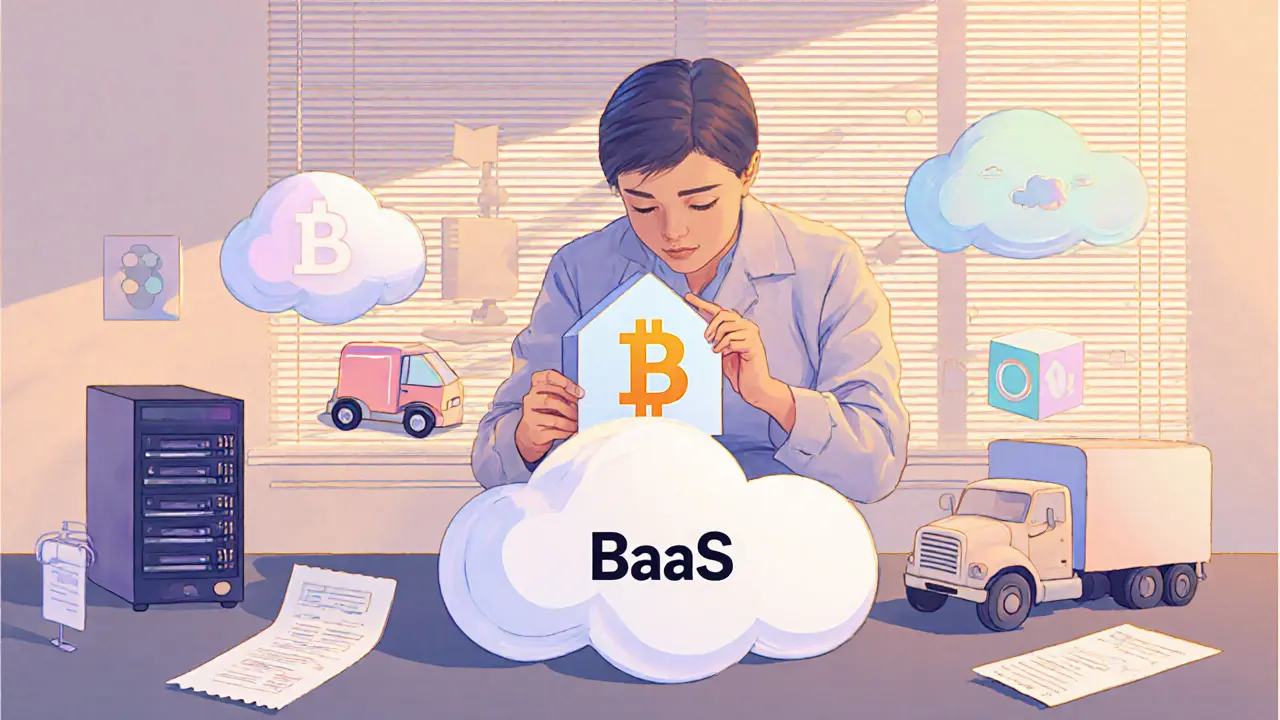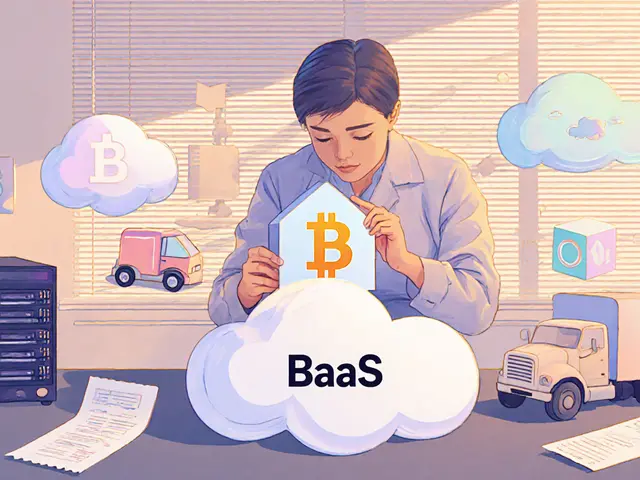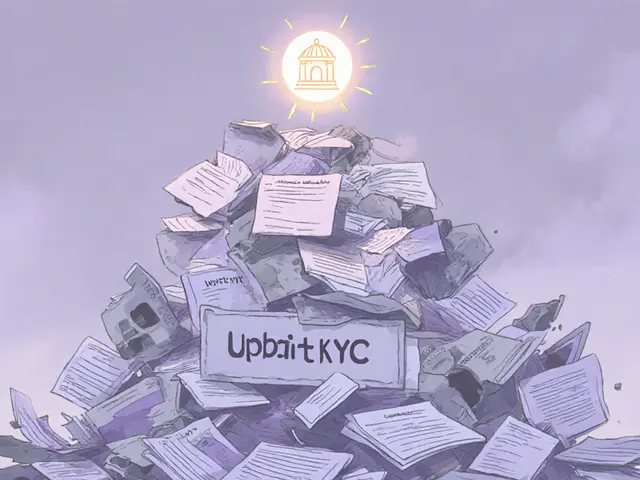BaaS vs Building Custom Blockchain: Which Is Right for Your Business in 2025?

BaaS vs Custom Blockchain Decision Tool
Business Blockchain Decision Quiz
Answer these 5 questions to determine if BaaS or custom blockchain is right for your business needs.
1. Do I need to control data location and encryption?
2. Am I in a heavily regulated industry (healthcare, finance, government)?
3. Do I need to change the consensus algorithm or block structure?
4. Can I afford $300,000+ upfront and a team of 5+ specialists?
5. Do I need to launch in 2 months?
Choosing between BaaS and building a custom blockchain isn’t about picking the shiniest tech-it’s about matching your business needs to the right tool. Too many companies jump into blockchain because it’s trendy, only to hit walls months later when their solution can’t scale, comply, or adapt. The truth? Most don’t need a custom chain. And some absolutely do. Here’s how to tell the difference.
What Is BaaS, Really?
Blockchain as a Service (BaaS) is like renting a fully built house instead of designing one from the ground up. Companies like AWS, Microsoft Azure, and IBM give you pre-built blockchain infrastructure-nodes, consensus engines, smart contract tools-all hosted and maintained by them. You focus on writing your app logic, not debugging distributed systems or managing server patches.
Most BaaS platforms use proven frameworks like Hyperledger Fabric or Ethereum-based networks. You pick your consensus type-usually Proof-of-Authority or PBFT-and connect via API. AWS Managed Blockchain handles up to 5,000 transactions per second. Azure scales to 10,000 concurrent users automatically. No need to hire a cryptography PhD just to get started.
Setup time? Two to four weeks if your team knows cloud platforms. Cost? Starts at $0.50/hour for a basic node. Enterprise plans run $8,500-$15,000/month, depending on usage. That’s a fraction of what custom development costs upfront.
When BaaS Makes Sense
If you’re in retail, logistics, or media, and you need blockchain for things like supply chain tracking, digital receipts, or content provenance, BaaS is the smart play. A 2024 Cisin survey found 82% of retail companies chose BaaS for supply chain apps because it scales on demand. When holiday sales spike, your blockchain scales with it. No new servers. No downtime.
Take TreasuryXL, a European bank. They used Azure Blockchain Service to verify internal documents. Saved $2.1 million in Year 1. No team of blockchain engineers. No six-month build cycle. Just APIs, a few developers, and a cloud dashboard.
BaaS also wins for testing. Fortune 500 companies use it for pilot projects-74% of them, according to Deloitte’s 2025 survey. Why? Low risk. If it fails, you walk away without a $300,000 loss. If it works, you can scale it fast.
What’s Missing in BaaS?
Here’s the catch: you don’t own the chain. You rent it. And that means limits.
Most BaaS platforms lock you into their stack. Want to change the consensus algorithm? Can’t. Want to tweak the block size or encryption protocol? Not without hitting a wall. A 2024 PixelPlex study found 63% of enterprises using BaaS hit customization roadblocks when their smart contracts needed special execution environments.
And then there’s compliance. GDPR, HIPAA, FINRA-these rules demand control over data. Where is your data stored? Who has access? Can you prove deletion? BaaS providers can’t answer those questions the way a custom solution can.
One company on Reddit, 'FinTechDev2023', built a high-frequency trading platform on Azure BaaS. After 18 months, they had to switch to custom. Why? They needed a custom consensus algorithm to handle microsecond-level trades. BaaS didn’t allow it.
What Is Custom Blockchain Development?
Building a custom blockchain means starting from zero. You choose the consensus mechanism-PoW, PoS, PBFT, or something entirely new. You design the data structure, the encryption, the node permissions, the API endpoints. You own every line of code.
This isn’t for startups or small teams. It’s for organizations with deep technical resources and high-stakes needs. Think banks handling billions in transactions, healthcare networks managing patient records under HIPAA, or government systems tracking land titles.
Custom chains can hit 15,000+ TPS with optimized consensus. They can embed compliance rules directly into the protocol-like auto-redacting PII before it’s written to the chain. You control the audit trail, the key management, the data sovereignty.

When Custom Blockchain Is the Only Choice
Regulation is the biggest driver. A BitGo 2024 analysis showed 92% of healthcare blockchain projects were custom-built. Why? Standard BaaS platforms can’t guarantee HIPAA-compliant data handling. You need to control how data is encrypted, stored, and deleted-down to the byte.
Appinventiv documented a healthcare consortium that spent $380,000 building a custom blockchain. In return, they cut annual compliance costs by $1.2 million. Why? Their chain auto-flagged and quarantined any unauthorized data access attempts. BaaS couldn’t do that without violating its own architecture.
Financial institutions are another group. 89% of core transaction systems in banking use custom chains, per 2025 data. Why? Speed, security, and control. A custom chain can implement a hybrid consensus that’s faster than PBFT but more secure than PoS-something no BaaS vendor offers out of the box.
The Hidden Costs of Custom Blockchain
Custom doesn’t mean better. It means harder.
Development takes 6-9 months. You need experts: blockchain architects, cryptographers, distributed systems engineers. The average team has 11+ months of experience in each role. According to a Consortium Blockchain Network survey, 73% of custom projects fail because teams lack the right skills.
Cost? $150,000-$500,000 upfront. That’s before ongoing maintenance. You need 24/7 monitoring. Node failures? You fix them. Security patches? You deploy them. A 2023 CertiK report found 78% of custom blockchain failures came from poor cryptographic implementation-not the code, but how keys were managed.
And support? No SLA. No 4-hour response time. If your chain goes down at 2 a.m., you’re either on call or paying a consultant $200/hour to fix it.
Security: BaaS vs Custom
This is where it gets messy.
BaaS providers like Kaleido and Azure run SOC 2 Type II audits, FIPS 140-2 encryption, and undergo 37% more security reviews than most custom setups, according to Microsoft’s internal data. That’s reassuring. But CertiK’s 2024 report says custom blockchains built by experienced teams have 22% fewer critical vulnerabilities.
Why the contradiction? Because BaaS is secure by default. Custom is secure only if done right. A team with one junior developer and no crypto background can build a custom chain that’s riddled with holes. BaaS? Even a novice can’t accidentally disable encryption.
Think of it like this: BaaS is a locked vault with a professional guard. Custom is a vault you built yourself-with the lock you designed. If you know how to build a good lock, you win. If not, you’ve made a target.

Vendor Lock-In: The Silent Killer
Here’s a truth no one talks about: BaaS locks you in.
Every platform uses its own APIs, node formats, and smart contract languages. Migrating from Azure to AWS? It’s not a simple switch. You’re rebuilding your app from scratch. A 2024 Capterra review found 61% of BaaS users felt trapped.
That’s why hybrid models are rising. In 2025, AWS launched its Hybrid Blockchain Framework. Azure 3.0 lets you plug in custom consensus layers. Gartner predicts 55% of enterprise blockchains will be hybrid by 2027-using BaaS for infrastructure, but custom code on top.
It’s the best of both worlds: speed and control. But it’s also the most complex. You need teams that understand both cloud platforms and blockchain internals.
Market Trends in 2025
BaaS is growing fast. MarketsandMarkets values it at $24.7 billion in 2025, with a 37.4% annual growth rate. AWS, Azure, and IBM own 71% of the market.
Custom blockchain? Smaller but growing at 28.6%. It’s concentrated in finance and healthcare. 89% of banks use it for core systems. 76% of healthcare networks use it for patient data.
Europe is pushing custom. GDPR forced 72% of enterprises there to build their own chains to keep data on-premise. In the U.S., retail and logistics? 85% use BaaS.
How to Decide
Ask yourself these five questions:
- Do I need to control data location and encryption? If yes → custom.
- Am I in a heavily regulated industry (healthcare, finance, government)? If yes → custom.
- Do I need to change the consensus algorithm or block structure? If yes → custom.
- Can I afford $300,000+ upfront and a team of 5+ specialists? If no → BaaS.
- Do I need to launch in 2 months? If yes → BaaS.
If you answered yes to any of the first three, and no to the last two, go custom. Otherwise, BaaS is the smarter, faster, cheaper path.
What’s Next?
The future isn’t BaaS vs custom. It’s hybrid. Companies are starting to use BaaS for infrastructure and custom smart contracts on top. It’s the best compromise: speed without sacrificing control.
But here’s the real takeaway: don’t choose blockchain because it’s cool. Choose it because it solves a real problem. And then pick the tool that fits your problem-not your ambition.
Is BaaS secure enough for enterprise use?
Yes, for most use cases. Major BaaS providers like AWS, Azure, and IBM run regular security audits, use FIPS 140-2 encryption, and maintain SOC 2 compliance. They’re often more secure than poorly built custom blockchains. But if your industry requires full control over data handling-like HIPAA or GDPR-BaaS may not give you enough control.
Can I switch from BaaS to a custom blockchain later?
You can, but it’s expensive and time-consuming. BaaS platforms use proprietary APIs and node formats. Migrating means rebuilding your entire application layer. Most companies that switch do so because their BaaS platform can’t support a critical feature-like a custom consensus algorithm. Plan for this early.
How long does it take to build a custom blockchain?
Typically 6 to 9 months for a production-ready system. This includes design, development, testing, security audits, and deployment. You’ll need a team with deep expertise in cryptography, distributed systems, and smart contract security. Rushing this leads to failures-73% of custom blockchain projects fail due to skill gaps.
What’s the biggest mistake companies make with BaaS?
Assuming it’s fully customizable. Many companies think BaaS means they can tweak everything. In reality, you’re locked into the provider’s architecture. You can’t change the consensus algorithm, block size, or core encryption. If your use case needs that level of control, BaaS will eventually hit a wall.
Do I need a blockchain at all?
Not always. Blockchain solves trust and immutability problems. If you just need a shared database with access controls, a traditional database with role-based permissions might be cheaper and faster. Ask: Do I need multiple untrusted parties to verify data without a central authority? If not, skip blockchain.
Which BaaS provider is best in 2025?
AWS Managed Blockchain leads with 28% market share, followed by Azure Blockchain Service (24%) and IBM (19%). AWS is best for developers already using AWS. Azure offers tighter integration with Microsoft tools like Teams and Power BI. IBM is strong in supply chain and finance use cases. Choose based on your existing cloud stack and support needs.







BaaS is literally the only way to go unless you're a bank with a crypto team of 20. I saw a startup try to build custom and they spent 8 months and $400k just to get a working demo. Then they pivoted to BaaS and launched in 3 weeks. 🤦♀️
I’ve been on both sides. BaaS saved my team when we needed to prototype a supply chain tracker in 6 weeks. We used Azure. No headaches. No midnight fires. But when we hit a wall trying to customize consensus for audit trails? Yeah… we had to swallow the cost of custom. It’s not about tech-it’s about control. And sometimes, control is worth the pain.
STOP pretending BaaS is ‘safe’ for regulated industries!! You think AWS knows your HIPAA compliance needs? NO. They know how to spin up nodes. Your data? It’s sitting in some server farm in Ohio with a generic encryption label. Custom isn’t harder-it’s necessary when lives and laws are on the line. Stop outsourcing your responsibility!
So… we’re all just supposed to magically know if we need a custom chain or not? I mean, I get the 5 questions-but what if you’re a small health startup with $50k and zero crypto devs? Do you just give up? Or do you gamble on BaaS and hope the auditors don’t ask too many questions? 🤔
BaaS is for people who dont understand distributed systems and think blockchain is just a database with hype. Custom chains are the only real solution because you control every layer. Most BaaS users are just running a glorified API wrapper and calling it blockchain. They dont even know what consensus means. The 63% who hit roadblocks? They shouldve known better
lol i tried BaaS for a doc verification thing and it kept timing out during peak hours. then i built a tiny custom chain with go and it handled 2000 req/sec. no cap. the cloud providers are great until you need to move fast. also the pricing? they charge you for every single node heartbeat. it adds up
You think you’re being smart by using BaaS? You’re just delaying the inevitable. Every company that uses BaaS eventually hits a wall where they need to rewrite everything from scratch. The vendor lock-in is a trap. And you call it ‘convenience’? That’s not innovation-that’s cowardice. Real builders build from the ground up.
Guys, I’ve mentored 12 startups this year and 9 of them went BaaS first. 7 of them are still alive. The other 3? They burned out trying to build custom with 2 devs and a YouTube tutorial. BaaS isn’t lazy-it’s strategic. Use it to validate. Then, if you need more, layer custom logic on top. Hybrid is the future. You’re not behind if you start simple.
BaaS is the digital equivalent of renting a mansion while pretending you own it. You get the view, the pool, the chandelier-but you can’t even change the lightbulbs without asking the landlord. And when your tenant leaves? You’re left with a contract that binds you for 3 years. The real question isn’t ‘which tech?’-it’s ‘do you want to be free?’
I love how people act like custom blockchain is this noble, heroic quest. Meanwhile, the BaaS team just got their product live in 6 weeks, made $2M in revenue, and didn’t have to fire 3 engineers because they couldn’t fix a signature bug. Sometimes ‘good enough’ is the most revolutionary thing you can do. 🙌
Let me tell you about the one company that went custom. They spent $500k, took 8 months, and built a chain so complex even their own devs couldn’t debug it. Meanwhile, the BaaS competitor launched a similar feature in 4 weeks with 2 people and made 3x the revenue. Tech isn’t about how deep you dig-it’s about how far you get.
i used aws baas for invoice tracking. worked fine. no drama. no sleepless nights. if you need to tweak the consensus? maybe you dont need blockchain at all. just use a normal db with signatures. sometimes the answer is simpler than you think
I work in healthcare compliance and let me say this: if your vendor can’t prove exactly where each byte of patient data is stored and how it’s deleted, you’re risking millions in fines. BaaS? Great for demos. Not for real HIPAA. We built custom. It cost more. But we sleep at night.
Wait so if I’m a student trying to learn blockchain, should I just use BaaS to experiment? Or is that like learning to drive by only riding in a Uber?
I’ve seen this movie before. First it’s ‘BaaS is the future!’ Then it’s ‘We had to go custom!’ Then it’s ‘Why did we waste 2 years?’ The truth? Most businesses don’t need blockchain at all. Ask yourself: do I need to remove a central authority? If not, stop wasting money. Blockchain isn’t magic. It’s a tool. Use it like one.
bass is fine idk why everyone overcomplicates this